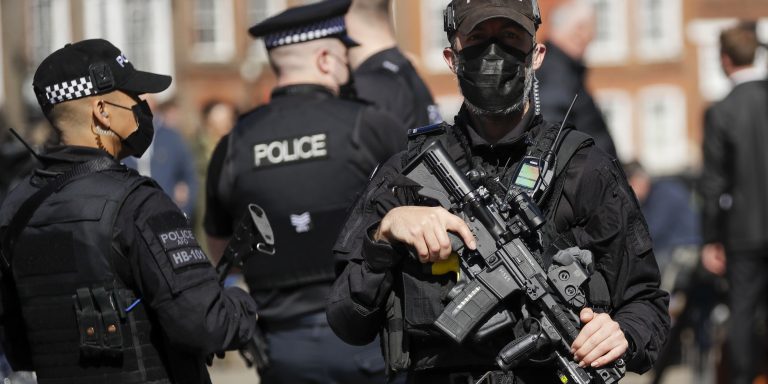INTELBRIEF
May 10, 2021
IntelBrief: Arrests of Far-Right Violent Extremists in UK Highlight Scale of the Threat

Bottom Line Up Front
- Authorities in the UK recently conducted a series of arrests of individuals suspected of terrorism offenses motivated by far-right violent extremism.
- The arrests follow the UK government’s proscription of the Atomwaffen Division, a transnational white supremacy extremist organization.
- The UK faces a multitude of threats, with jihadist ideology still a significant motivator of terrorism but accompanied by an increased focus on far-right violent extremism.
- The platform of far-right violent extremists in the UK has evolved over the past decade to incorporate xenophobia, populism, and anti-globalism.
Authorities in the United Kingdom recently conducted a series of arrests of individuals suspected of terrorism offenses motivated by far-right violent extremism. The arrests included a sixteen-year-old boy, highlighting the complexities of the threat in the UK. There have been numerous teenagers involved in the far-right violent extremism milieu in the UK. In February, a British teenager was convicted of terrorism offenses for his involvement in the British wing of the Feuerkrieg Division and linkages with a group in Estonia. The most recent arrests occurred across several towns, including West Yorkshire, Keighley, Swindon, and Anglesey. The arrest in Keighley required a bomb disposal team to investigate suspicious materials. All five of the arrests were for “suspicion of being concerned in the commission, preparation or instigation of acts of terrorism,” according to BBC News.
The arrests follow the U.K. government’s recent proscription of the Atomwaffen Division, a white supremacy extremist organization emerging from the United States and with chapters worldwide. Along with banning Atomwaffen, the UK also listed as a terrorist organization its alias, the National Socialist Order. Earlier, in December 2016, the British government banned the far-right violent extremist group National Action (NA), the first far-right group designated as terrorists by the UK since 1940. The move was effective in helping to dismantle the organization; however, it also led to splintering, further complicating efforts of law enforcement and the intelligence services. Moreover, the ban failed to sufficiently undermine the brand appeal of NA, which continued to thrive in various forms online given its origins in the British National Party (BNP) and the enabling environment in the UK. National Action members are known to have participated in training camps headed by Denis Nikitin, the Russian MMA fighter and neo-Nazi with links to the Azov Battalion in Ukraine.
The threat landscape in the United Kingdom has evolved considerably over the past several decades. While in the 1980s and 1990s the UK was primarily concerned with terrorism perpetrated by ethno-nationalist groups like the Provisional Irish Republican Army (PIRA), by the late 1990s the conflict wound down. However, soon after, the threat posed by Salafi-jihadists surged to the forefront of security concerns, and on July 7, 2005, several British jihadists inspired by al-Qaeda launched deadly attacks throughout London. In 2021, the United Kingdom faces a multitude of threats, with jihadist ideology still a significant motivator of terrorism. Far-right violent extremism and the growth of white supremacy extremism throughout the country have, however, attracted increased concern. In November 2020, Metropolitan Police Assistant Commissioner Neil Basu said that far-right violent extremism is the fastest growing threat in the UK. COVID-19 lockdowns and related isolation have further exacerbated the threat, as more people spend more time online and are increasingly susceptible to radicalization by terrorist propaganda. There are now more referrals to the UK’s Channel program, under the overall umbrella of PREVENT, which supports individuals vulnerable to radicalization. Although PREVENT has focused primarily on preventing militant Islamist violence, the framework is intended to be ideologically agnostic, and there has been a significant uptick in referrals related to violent far-right groups.
The British far-right has long looked for opportunities to expand internationally. In particular, members of the British far-right have looked to Greece and emulated Golden Dawn, a Greek neo-Nazi party that has experienced electoral success over the years. There have also been a number of British citizens that have traveled to Ukraine, and British neo-Nazis have established ties with groups like the Nordic Resistance Movement (NRM). Tommy Robinson, the far-right provocateur and former leader of the vigilante group the English Defense League (EDL), did a “media tour” in Russia last year; he has reportedly been seeking Russian bank accounts as a place to move his money, according to the New York Times. The platform of far-right violent extremists has evolved over the past decade, moving beyond racism, anti-Semitism, and white supremacy, to include xenophobia, populism, and elements of anti-globalism. As anti-government sentiment spreads worldwide, and issues such as anti-vaccination campaigns and conspiracies related to 5G networks proliferate, there is growing concern that far-right violent extremism will metastasize, making the counterterrorism challenge in the United Kingdom even more complex.